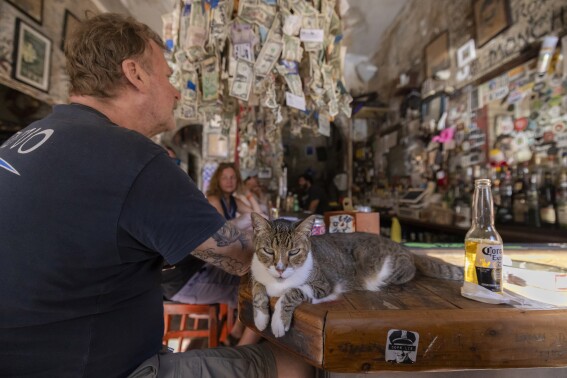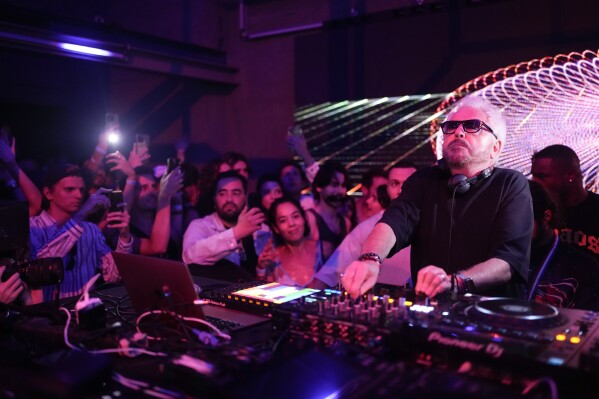Love is a phenomenon that stretches far and wide—and some people have a relationship structure that proves it.
Newsweek spoke to married couple Leah and Tim Folta about their open relationship, now turned polyamorous, and how they work daily to stay on the same page while pursuing a relationship structure they say is "enriching". Leah and Tim, 33 and 36, respectively, have been together for 11 years, in an open relationship for three, and polyamorous for one.
There are many shades of "ethical non-monogamy," the umbrella under which both open relationships and polyamory lie. While open relationships have traditionally focused on sexual non-exclusivity, polyamory usually involves non-exclusivity in romance and intimacy as well—and all of these relationship structures are based on the consent of all parties involved.
Terms shift and expand as time passes, and Leah and Tim have adapted their relationship titles to reflect what they feel is best for them and what they want.
It all started, though, with a simple curiosity about intimacy with other people.
"Our relationships with other people were never because of a lack with each other," Leah said. "We love each other so much, romantically and as friends, and have a happy sex life. We're both just adventurous extroverts who feel that, if you only get to live one life, this is the way we want to do it."
Set Rules to Maintain Trust and Expectations
Like the terms of their relationship, Leah and Tim's rules around their relationship structure have evolved, too. While they used to have many rules, they said growing more comfortable with their relationship structure has meant they can be a bit more lax. Still, there are some things they've agreed on.
"We always let each other know when we are seeing another person and who they are," Leah said. "Nothing is secret from each other, but neither of us enjoy hearing the gory details either, so it's been a process navigating what exactly to share and when."
While the pair don't have any rules around physical intimacy, they take emotional intimacy with others very slow. They don't always meet each other's partners—only when one of them feels strongly about it.
Quality time is a bit murkier, but similarly resolved with communication: "How much time and energy we give other partners versus how much time and energy we give each other is a pretty constant discussion," Leah said. "If either of us is feeling lonely and needs more attention or affection, we just tell each other."
Logistically, the couple try to be conscious about things like sleepovers with other partners at their place, and spending money from their shared accounts on other partners. Nothing is written in stone, but it takes careful discussion and planning.
"Whenever we try something new, it's always with the agreement that we can decide we didn't like it and take that thing off the table in the future," Leah said. "You can also temporarily take something off the table and put it back later. What's great about open relationships is also what's so challenging—everything is negotiable."
How to Handle Jealousy
A commonly cited concern about an open relationship structure is jealousy, and although there are other challenges to being in a healthy non-monogamous relationship, Leah said she still experiences the green monster at times.
"I definitely still experience jealousy. For example, I like to learn about partners' partners and dating history, but it almost always makes me feel jealous," she said. "I wouldn't want to miss out on knowing that part of them and I love to share about my own partners, so it's something I've decided to tolerate and work on even though it's uncomfortable."
Leah said she finds jealousy generally to be a symptom of ego—but she does check in with herself when she feels it, to make sure something isn't actually wrong and she isn't being mistreated: "Women are generally very used to suppressing their own feelings or discomfort for the sake of their partners," she said.
"I don't want to advocate for anyone to ignore a feeling that's telling them something is wrong...A huge part of opening our relationship has been managing jealousy, but I always want to give that caveat."
Something that's spoken about less is "compersion," which could be argued as jealousy's opposite: that is, the feeling of genuine joy a partner feels for another partner's happiness with someone else.
"We both do feel compersion for one another now, but it wasn't immediate," Leah said. "We feel happy for each other when we have a good date or are excited about a new person."
Stay Open-Minded and Patient
Not everyone was ecstatic when Leah and Tim announced they were opening their relationship—most approached it with a "cautious acceptance," Leah said, which is still largely the case. She said she loves talking about non-monogamy when she gets the chance, but that chance doesn't come very often.
If she were to give advice to couples considering opening their relationship, Leah said pace is key.
"Move at the pace of whichever one of you is the least comfortable," she said. "Give your partner time to think. I used to think that it was more helpful to push someone when they're feeling uncomfortable.
"I thought that honoring those feelings would only make the feelings worse somehow, but now I know that the opposite is true. Knowing that your partner cares about your negative feelings and will support you is a big part of feeling safe trying new things."
Leah and Tim also sought professional help to work through the early days of non-monogamy. They saw a couple's therapist for a few years, which they said left a positive impact on their relationship.
It's not easy, Leah said, but opening a relationship—crucially, if the desire to do it is there—can be a transformative experience.
"Living this way has been incredibly beautiful, exciting and enriching. We love it," she said. "If you can't imagine ever trying it or recoil at the thought, then it might not be for you and that is totally OK! There is nothing objectively better about non-monogamy. It has required so much time and effort to navigate and it is worth it—because we both really want to."
Leah shares her reflections on non-monogamy and relationships on her TikTok page.
Disclaimer: The copyright of this article belongs to the original author. Reposting this article is solely for the purpose of information dissemination and does not constitute any investment advice. If there is any infringement, please contact us immediately. We will make corrections or deletions as necessary. Thank you.



